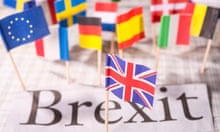More than a million workers from eastern Europe are working in Britain following a rise in the number of foreign nationals entering the labour market before the Brexit vote.
The total number of EU workers employed in the UK increased by almost 90,000 in the three months to the end of June, pushing the overall employment rate to another record high in statistics, which were published on Wednesday.
Part of the rise in employment was attributed to non-UK EU nationals, and especially those from eastern Europe. The number of migrant workers from Poland, Hungary, Czech Republic, Slovakia, Slovenia, Latvia, Lithuania and Estonia topped 1 million for the first time. Migrant workers from these eastern European countries reached a record 1,007,000 in the second quarter of the year, up 44,000 on the previous quarter.
The number of workers from outside the UK increased by 110,000 to 3.45 million in the second quarter, compared with a rise of 58,000 in the number of UK nationals in work to 28.2 million.
Britain’s attraction as a destination for EU workers is expected to wane over the next year as the impact of the falling pound, a weaker economy and a degree of negativity about migration from some quarters act as a deterrent.
Jonathan Portes, an economist of the National Institute for Economic and Social Research, said all three factors would lead to a sharp fall in numbers and meant recent figures represented a “high watermark”.
John Philpott, the director of JobsEconomist.com, said: “There will be some migrants who think twice about coming to the UK because it could be more difficult to settle and they might feel they are more vulnerable to abuse.”
The Office for National Statistics figures also indicated that the jobs market had not been dented in the immediate aftermath of the vote. The ONS said the claimant count – the number of people claiming jobless benefits – fell by 8,600 to 763,600 in July, compared with expectations of a rise of 9,500, to leave the total number on job related benefits at 763,600.
It was the first monthly fall since February 2016 and appeared to dispel fears that the Brexit vote would trigger panic among employers and widespread job losses.
Economists welcomed the jobs report, which showed that there were 31.75 million people in work in the second quarter of the year, 172,000 more than for January to March 2016 and 606,000 more than for a year earlier. The employment rate, which measures the proportion of people aged from 16 to 64 who are in work, was 74.5%, the highest since comparable records began in 1971.
The unemployment rate in the three months to the end of June was unchanged at 4.9%. Average weekly earnings excluding bonuses rose 2.3% over the same period, up from 2.2%.
The number of people unemployed, defined as those not in work but seeking and available for employment, was 1.64 million for the three-month period, the lowest since March to May 2008.
Alan Clarke, an economist at Scotia Bank, said concerns about the economic impact of the Brexit vote were not supported by the data, at least in the short term.
He said: “Ahead of the referendum, speculation was that the economy would grind to a halt, hiring would stall and investment plans would be put on ice. The first two haven’t happened; we will find out next week whether the third came good.
“But this does provide a glimmer of hope that if fears of the pre-Brexit jitters proved unfounded, maybe the post-referendum doom and gloom may equally prove to have been overcooked.”
Recent surveys have shown that while many companies have shelved investment plans and industries such as construction have suffered a sudden loss of confidence, employers are reluctant to cut staff for what may prove to be a short lived period of uncertainty.
A report by the Treasury collating the predictions to 2020 of independent economic forecasters found a consensus that economic growth would remain muted between now and the end of the decade. Predictions that growth will remain below 2% also meant unemployment would rise by about 350,000 to approximately 2 million people.
Wages growth was likely to remain subdued, especially after being adjusted for inflation, which has begun to rise.
The Resolution Foundation, an independent thinktank, said that with inflation up from below zero last year to 0.6% last month and expected to climb more steeply in the coming months, “Britain’s poor performance on pay is a major cause for concern”.
Scott Bowman, a UK economist at Capital Economics, said: “The vote to leave the EU should cause some firms to put hiring decisions on hold or cut back headcounts altogether, resulting in the unemployment rate drifting up over the coming quarters. This should contain any further rises in earnings growth and keep domestic cost pressures in check.”
He added that the Bank of England should be able to follow through with more monetary easing to support the economy, such as interest rates and a multibillion-pound bond-buying programme, without worrying about stoking domestically generated inflation too much.








